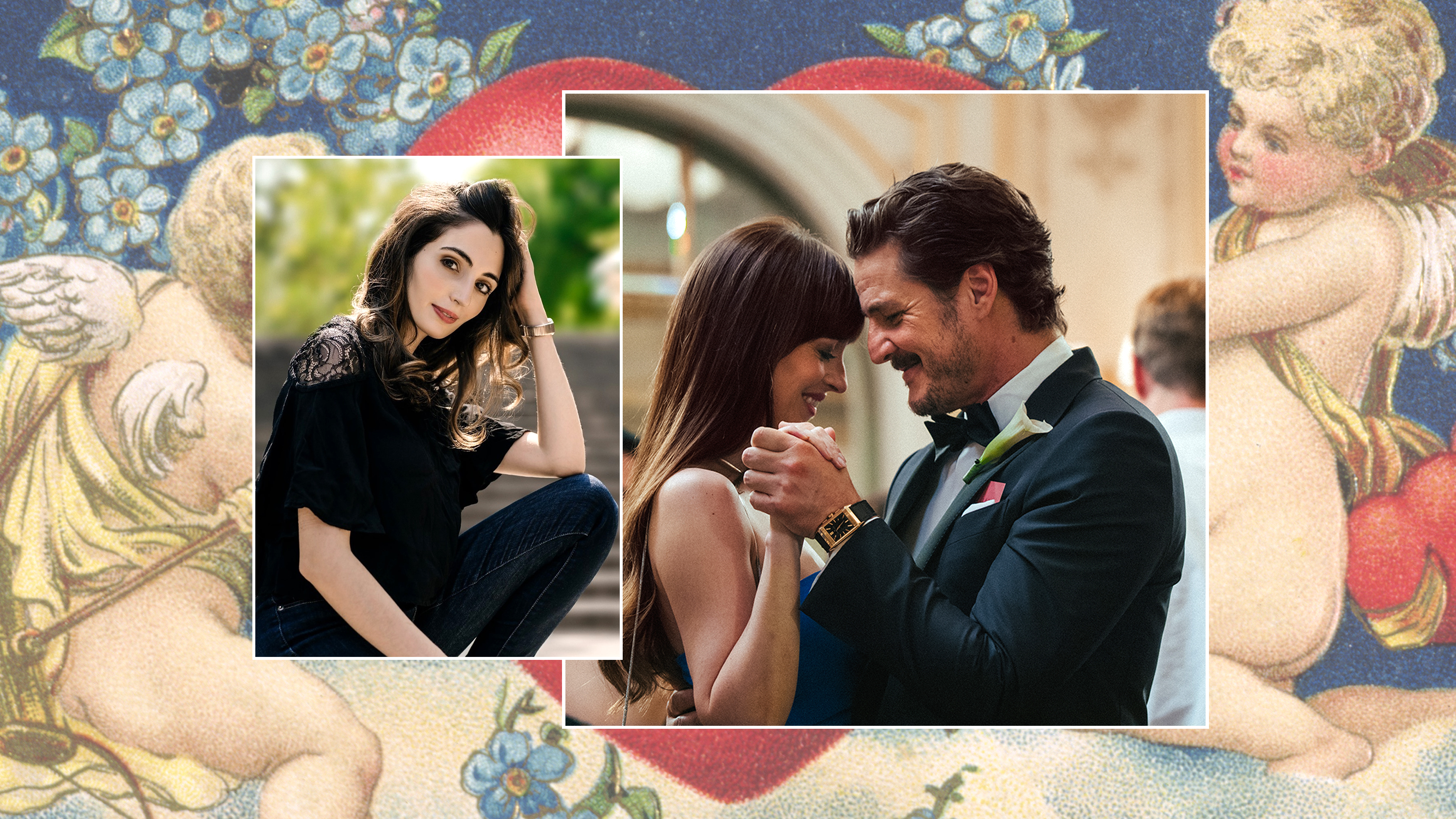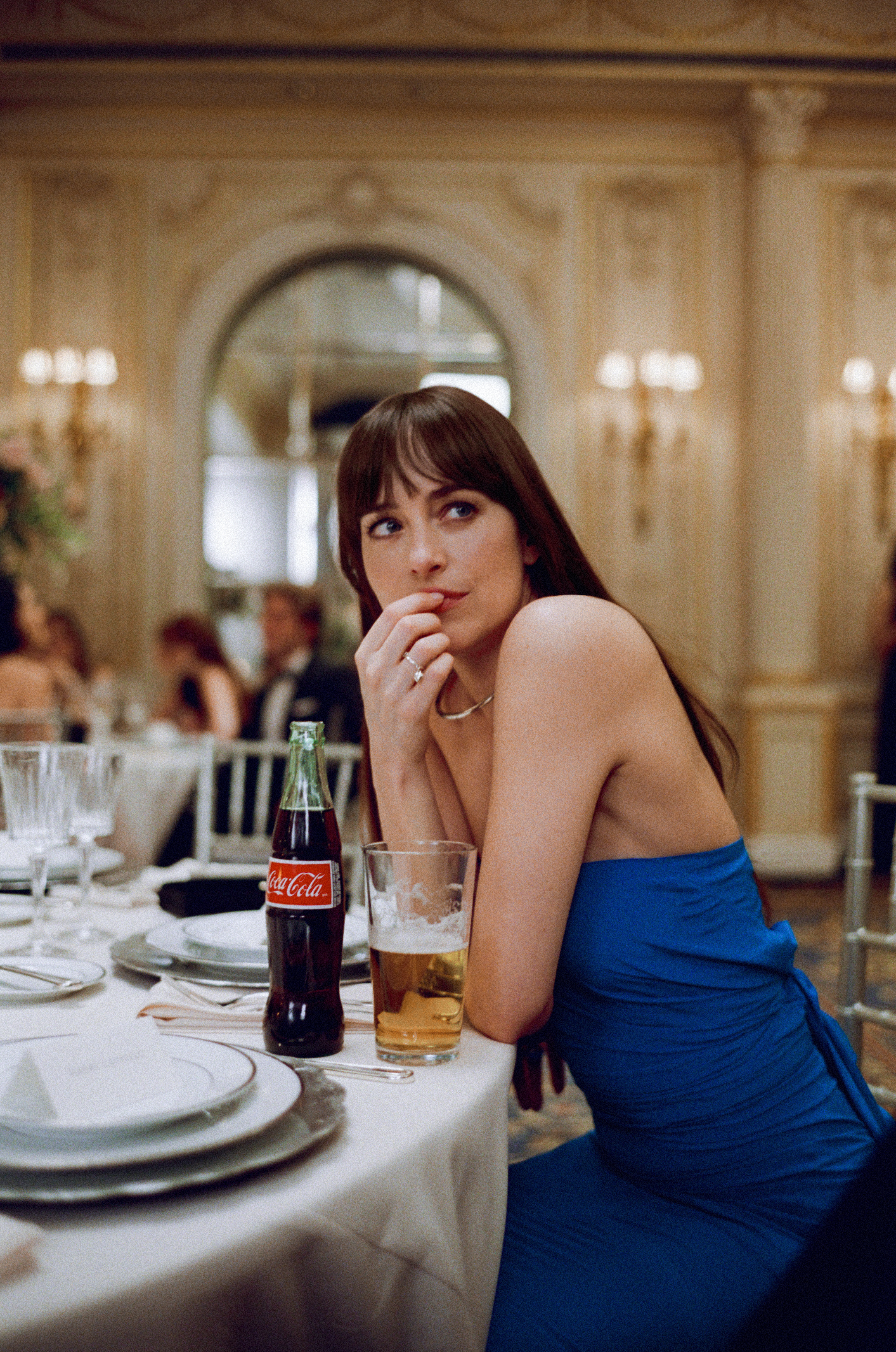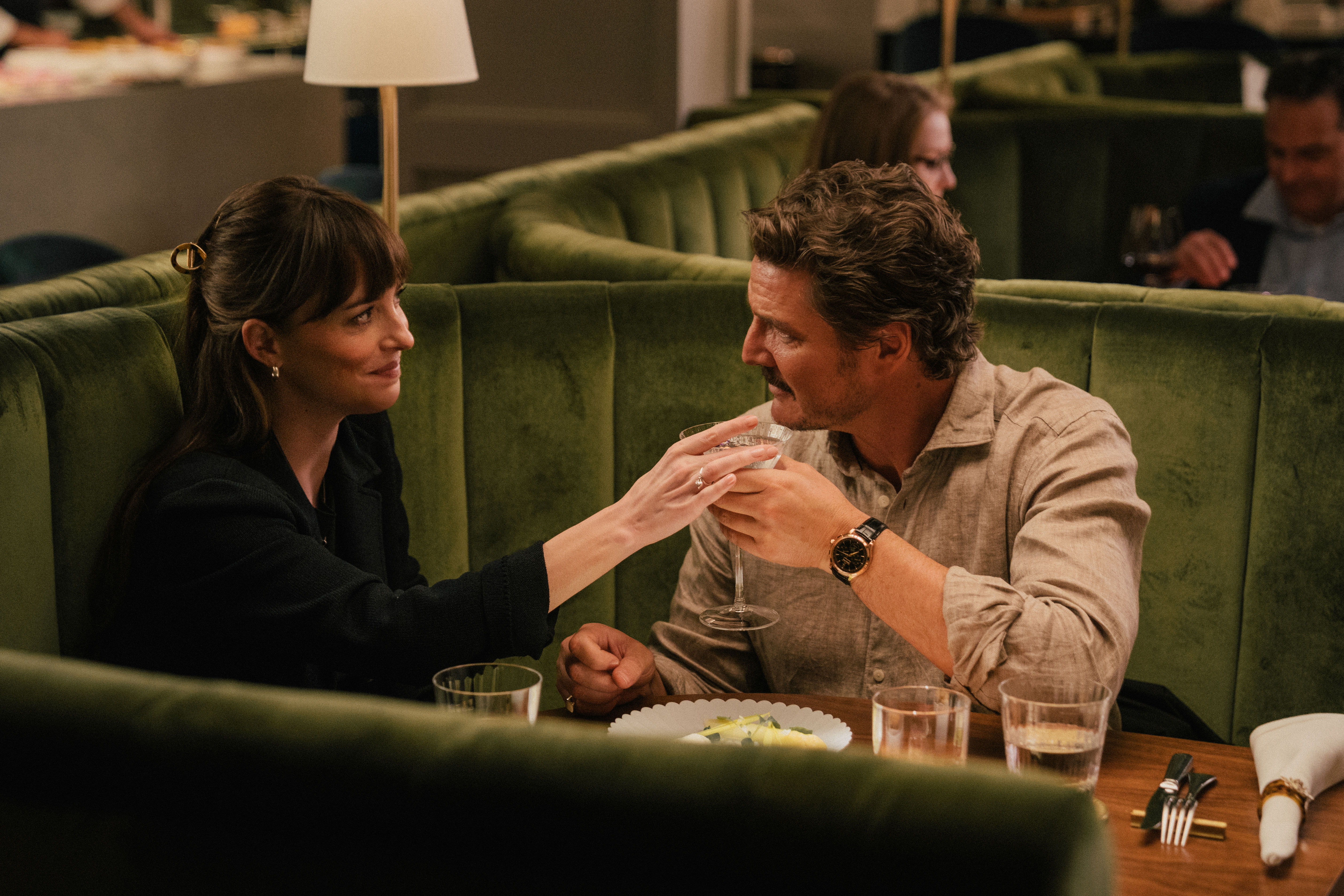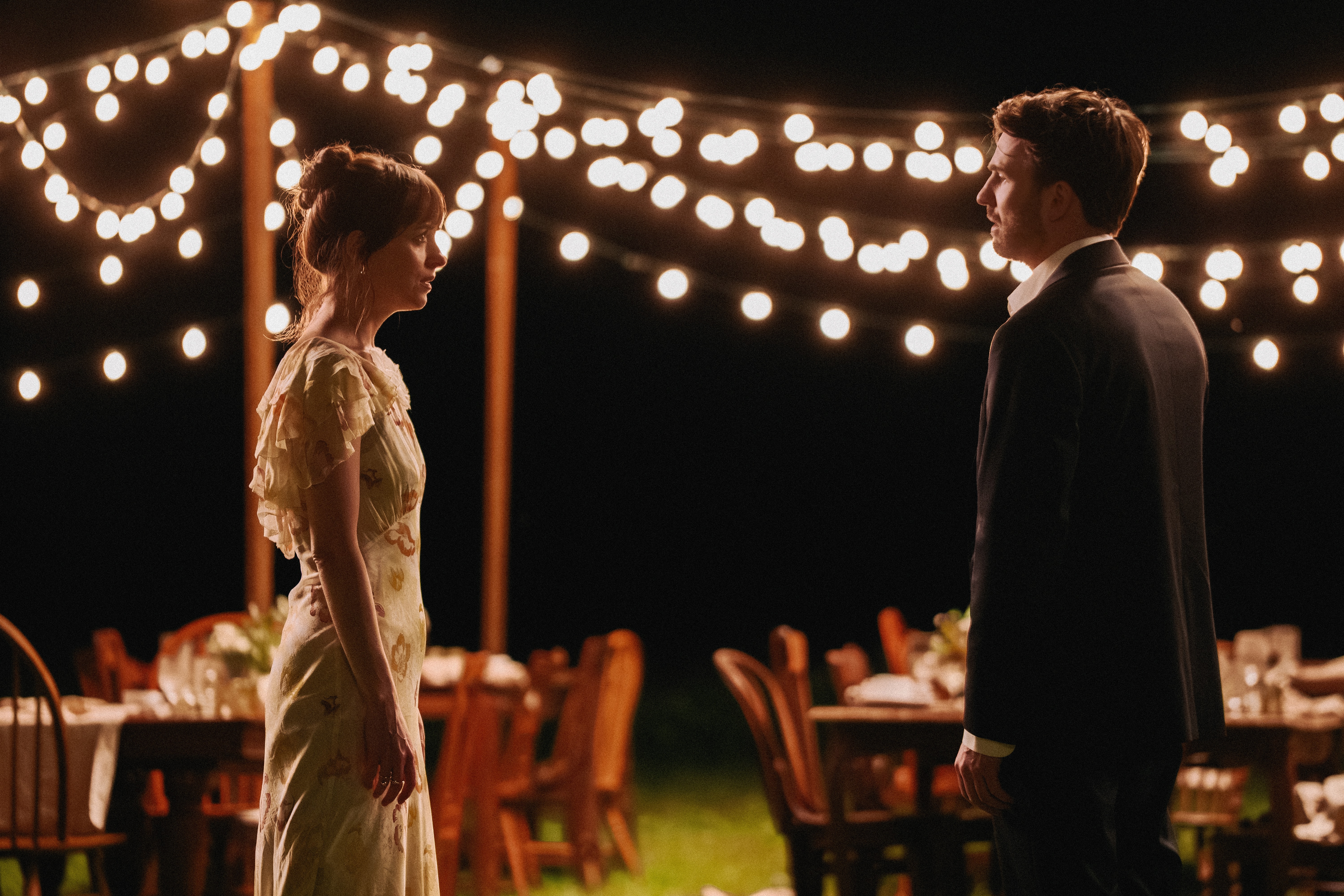A Luxury Matchmaker Reveals How Realistic 'Materialists' Is
We asked Liana Bell, Head of Member Experience at BOND, to share her thoughts on Celine Song's new film starring Dakota Johnson.

Content warning: The below contains both details from the plot of Materialists and references to sexual assault. In Celine Song’s new film Materialists, Dakota Johnson plays Lucy, a New York-based matchmaker swanning about in chic outfits as she helps her clients find “the one,” while dealing with a love triangle in her own life. Her career seems fabulous: The firm she works for, Adore, throws its staffers (all model-esque) parties at their SoHo office whenever they marry a client, and then they snag an invite to the luxe wedding. But the A24 romance film also features Lucy’s meetings—including one with a man in his 40s who finally wants to date older women, by which he means 27, and another with a woman who has a two-page document listing all of her non-negotiables.
For those of us in the dating app trenches, Materialists—inspired by Song’s own experience working in the industry—offers insight into all facets of the matchmaking world. But what does a contemporary matchmaker think of the movie?
Marie Claire asked Liana Bell, Head of Member Experience at the luxury matchmaking service BOND, for her thoughts on the film, after seeing it at an early screening thrown for matchmakers. “I could relate to a lot of what was occurring in the movie, even some of the absurdities,” Bell tells Marie Claire over Zoom ahead of the film’s June 13 release date.

Lucy (Dakota Johnson) at a wedding for one of her clients in Materialists.
Bell initially took a matchmaking job while working as an actor and has been in the business for over 10 years, even working with Song “back in the day.” Now at BOND, her workplace resembles the fictional Adore, as it features an application process and caters to an exclusive network, with personalized support in making connections.
Materialists explores universal questions about love—what we want versus what we need. And while the film has its fair share of swoon-worthy moments, much of its depiction of the matchmaking process strips those romantics bare by comparing finding one’s “soulmate” to an equation.
“Some people treat it as a mathematical formula, to be honest with you,” Bell says. “I think that's part of the struggle that people are having, even on the apps. Our society has turned dating into a mathematical formula.”
She adds, “Matchmaking is equal parts mathematical and creative.”
Get exclusive access to fashion and beauty trends, hot-off-the-press celebrity news, and more.
With Materialists now in theaters, Bell told us how realistic she thinks it is and about her own experience, including her most shocking request and whether she gets to see clients walk down the aisle.

Materialists marks Celine Song's follow-up to the Oscar-nominated Past Lives.
MC: The film shows interviews with clients who have very specific preferences in terms of age, height, and other attributes. Are your clients that specific about what they are looking for in a potential partner?
LB: Everyone comes to us for different reasons. There are those people who are trying to ‘build a bear.’ They are trying to build this perfect image of this person in their head. I find those clients are probably the hardest to work with. They often have the most unrealistic expectations. Because I think, as the movie showed with the caveman scenes, it was so simplistic back then. Now, just because we have access to all these Instagram models, all these images that we're inundated with every single day, we feel that we can recreate that. People who come to us with very specific criteria, I find struggle the most because they're trying to create something and force something to happen, and I don't think the universe works that way.
MC: Did those conversations in the movie feel realistic to you when you're talking with clients?
LB: Of course, there's some exaggerated comedy. It's a very delicate balance that we have to deal with because matchmaking is a business, right? Oftentimes, when they assign a matchmaker to a client, they're being sold this thing, and then the matchmaker has to deal with it. And in some cases, you're not there to fix the client. You get a sense over time in terms of which clients you can expand [their dating pools] and which ones are stuck in their own way. At the end of the day, you're just serving whatever they bought. [Is this client] really trying to find somebody? So, you're in constant conflict as somebody who's on the matching side of things.

"There are those people who are trying to 'build a bear.' They are trying to build this perfect image of this person in their head," Bell describes of some of her clients.
MC: As Lucy becomes closer to her client Sophie (played by Zoe Winters), there’s a seemingly delicate balance of the client-matcher relationship. Is that something you’ve dealt with?
LB: I used to work with ladies a lot. We don't anymore, and at BOND, we only cater towards male clientele. Sometimes we hear things, and they treat us sometimes as their therapists, because I think it's such a vulnerable thing that they've signed up for. I think what makes a successful matchmaker is somebody who lends an ear. But at the same time, it is a very delicate line, because, for example, I never necessarily went to school to be a matchmaker. A lot of it relies on my training of observing people, my acting background, all that stuff that I've picked up over time, and understanding of cultural nuances. There are cases when clients sometimes do treat me like a therapist, and I have to remind them, ‘This is not in my lane.’ You also have to be smart about knowing when you're crossing boundaries because you don’t want to give advice that you aren’t qualified to give.
MC: The idea of value comes up frequently throughout the film. How much does that and socioeconomic background play into the matchmaking world?
LB: Part of when you meet a client is also understanding, Even if they come from a certain socioeconomic background, are they open to other types? Understanding the client's story and what their background is, where they've lived, what schools they've gone to—they're all going to influence how the person thinks and acts. There are some clients who straight up tell us, ‘I went to Harvard. I just want somebody who went to an Ivy League college,’ and that it's non-negotiable. But I think when someone boxes themselves too much into these things, they are disqualifying potentials that could be great options. When people say, for example, ‘I want someone intelligent,’ I think what they're indicating is somebody with a curiosity, because you could have gone to Yale or Harvard, but if you don't have a curiosity to learn, then maybe you're intelligent in a different way. Our job is very much like a casting director because once you understand the story and the playing field that you're in, then you can cast accordingly.

Lucy is swept off her feet by Harry (Pedro Pascal), after meeting him at the wedding for one of her clients.
MC: Materialists addresses the economic elements of dating, and all of Lucy’s clients are wealthy. Is that similar to the clientele that you have at BOND?
LB: It is more of a luxury service. The prices [for matchmaking companies] can span in range—there are companies that charge up to $75,000 or $100,000. We're not in that range. We are trying to make it a little bit more affordable, but somebody in New York City, if they make over $100,000 or $150,000, they probably can afford the service. Typically, the kinds of people we work with are busy or professional types.
MC: Is the concept of a “unicorn,” like how the matchmakers in the movie refer to Pedro Pascal’s character Harry, something that you use in the industry?
LB: I've heard that term. Part of the sales process with some companies, they always say, ‘Oh, you're looking for a unicorn.’ In that case, are they looking for a unicorn because they're very picky? Or are they looking for a unicorn because they themselves are a very interesting individual with a lot [going for them]? You have to play around to see what might mesh with the client.
Our job is very much like a casting director because once you understand the story and the playing field that you're in, then you can cast accordingly.
MC: What would be considered a “good client” who might make a good match for someone?
LB: The ideal client is somebody who is open-minded in many ways, the most patient with the process, who trusts the process, and who knows that it is dating. Towards the end of the film, with the sexual assault, there are things that are out of our control. So, understanding that part of it and knowing that our job on this end is to keep the person positive to keep them going. Especially in New York City, people can get jaded about the dating scene. A good client is someone who knows that there are certain things we can control.
MC: Speaking of what happens to Sophie, do you typically do background checks on clients?
LB: We do background checks. After each date, we have a feedback component where people can leave feedback on their matches. If we sense that a client is disrespecting us or there are already certain behaviors I can pick up on in advance, we automatically try to get ahead of it, because actions speak louder. Even if I Google somebody and try to find something, and I don't see anything, but I sense the way they're treating us is disrespectful, how can I trust other people to go out on a date with this person if they're treating us like that? We use our common sense or intuition as best as we can, but at the end of the day, there are going to be unpredictable things that happen. I haven't seen too many things happen in my 10 years that were as extreme as what happened in the movie.

Materialists also sees Lucy reconnect with her former flame John (Chris Evans), who comes from a working class background.
MC: Lucy’s workplace is all women. Is that typical in the industry?
LB: It's majority women. Although, I'm surprised there aren't more men doing this. As the movie showed, it's hard not to be emotionally attached. When a date happens, we're equally as invested in what happens as the client. I'm surprised there are not more men who do this, but I think it's also a lot harder to open up to men. It is something we've been tampering with at BOND—adding a couple more males to our roster—especially because we are handling mostly male clients at this point.
MC: How does it feel when you set up a couple who end up working out?
LB: It makes all the other stuff worth it. It's a very interesting job because there is never a guarantee, and you have to remind the client that the best I can do is listen to you and put forward people who increase your chances of meeting that person. When that happens, it's awesome. I wish I were invited to more of the weddings as the Dakota character did. Sometimes clients want to be private about it, and in some cases, they get married and we don't even know.
MC: How many people have gotten married from matches that you made?
LB: I can't really keep track. I would say at least 20 of them, but again, those are the ones I'm aware of.
MC: Over the past 10 years doing this, what is one of the funniest anecdotes that stands out about matchmaking?
LB: This comes back to some of the requirements [for a client]. There are certain things we just simply cannot screen for, like, ‘How big a guy is packing?’ At some point, I was asked if I could [find out]. How do you professionally respond to that? I think that's probably one of the most absurd things I was ever asked.
Kerensa Cadenas is a freelance journalist based in New York. She's previously held positions at Thrillist, The Cut, Entertainment Weekly, and Complex. Her byline can be found at publications like Vanity Fair, Indiewire, Rolling Stone, Vogue, NYLON Bustle, Vulture, and other outlets. She's always had a pop culture obsession from film, literature, television, music, and everything in between. On weekends you can find her going dancing, seeing comedy shows or films, or hanging out with her cat.